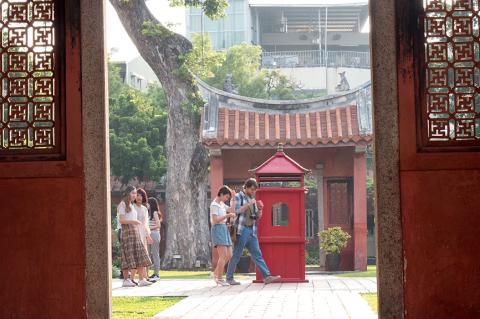Audiences will be able to see the beauty of Tainan on the silver screen when director Hsu Ching-chu’s (徐慶珠) latest film, When Green Turns to Gold (最是橙黃橘綠時), hits theaters on Jan. 11.
The inspiration behind the film and its title came from a poem by Song Dynasty poet-statesman Su Dongpo (蘇東坡), Hsu said.
The film tells the story of two 25-year-old friends with different personalities who leave their homes to study and work in a foreign place, she said.

Photo: CNA
Set in the 1990s, the film was shot in a variety of locations, including Tainan, Taitung County and Kagoshima, Japan.
On Monday, Hsu and one of the film’s lead actresses, Lee Yi-chieh (李亦捷), returned to Tainan to talk about their experiences filming in the city.
They held a news conference at the Tainan Cultural and Creative Park (台南文化創意產業園區), a Japanese colonial-era government building that has been designated a monument by the city.
Nearly half of the scenes in When Green Turns to Gold were shot in Tainan, said the Audiovisual Support Center of the Tainan City Government’s Cultural Affairs Bureau, which subsidized the film.
The center said filming took place at locations including Anping Fort (安平古堡); the Eternal Golden Castle (億載金城); the Confucius Temple (孔廟); a former village for police officers and their dependents; National Cheng Kung University; Hutoupi Scenic Area (虎頭埤風景區); Ciaotou Beach Park (橋頭海灘公園); and Blue Dragon Art Company (蔚龍藝術).
In the film, Lee plays a character who works at National Cheng Kung University’s Foreign Language Center, it added.

Alain Robert, known as the "French Spider-Man," praised Alex Honnold as exceptionally well-prepared after the US climber completed a free solo ascent of Taipei 101 yesterday. Robert said Honnold's ascent of the 508m-tall skyscraper in just more than one-and-a-half hours without using safety ropes or equipment was a remarkable achievement. "This is my life," he said in an interview conducted in French, adding that he liked the feeling of being "on the edge of danger." The 63-year-old Frenchman climbed Taipei 101 using ropes in December 2004, taking about four hours to reach the top. On a one-to-10 scale of difficulty, Robert said Taipei 101

Nipah virus infection is to be officially listed as a category 5 notifiable infectious disease in Taiwan in March, while clinical treatment guidelines are being formulated, the Centers for Disease Control (CDC) said yesterday. With Nipah infections being reported in other countries and considering its relatively high fatality rate, the centers on Jan. 16 announced that it would be listed as a notifiable infectious disease to bolster the nation’s systematic early warning system and increase public awareness, the CDC said. Bangladesh reported four fatal cases last year in separate districts, with three linked to raw date palm sap consumption, CDC Epidemic Intelligence

US climber Alex Honnold left Taiwan this morning a day after completing a free-solo ascent of Taipei 101, a feat that drew cheers from onlookers and gained widespread international attention. Honnold yesterday scaled the 101-story skyscraper without a rope or safety harness. The climb — the highest urban free-solo ascent ever attempted — took just more than 90 minutes and was streamed live on Netflix. It was covered by major international news outlets including CNN, the New York Times, the Guardian and the Wall Street Journal. As Honnold prepared to leave Taiwan today, he attracted a crowd when he and his wife, Sanni,

Two Taiwanese prosecutors were questioned by Chinese security personnel at their hotel during a trip to China’s Henan Province this month, the Mainland Affairs Council (MAC) said yesterday. The officers had personal information on the prosecutors, including “when they were assigned to their posts, their work locations and job titles,” MAC Deputy Minister and spokesman Liang Wen-chieh (梁文傑) said. On top of asking about their agencies and positions, the officers also questioned the prosecutors about the Cross-Strait Joint Crime-Fighting and Judicial Mutual Assistance Agreement, a pact that serves as the framework for Taiwan-China cooperation on combating crime and providing judicial assistance, Liang